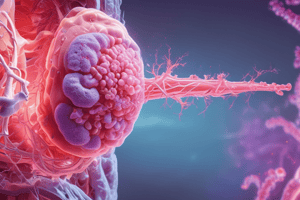Podcast
Questions and Answers
What is the main diagnostic approach for bronchiectasis, as mentioned in the text?
What is the main diagnostic approach for bronchiectasis, as mentioned in the text?
- Imaging studies only
- Clinical symptoms only
- Laboratory tests only
- Combination of clinical symptoms, imaging studies, and laboratory tests (correct)
How can chronic inflammation and infection in bronchiectasis affect accessory organs?
How can chronic inflammation and infection in bronchiectasis affect accessory organs?
- It has no effect on accessory organs
- It causes enlargement of the liver and spleen
- It leads to dysfunction of the liver and spleen
- It can affect the liver and spleen (correct)
Why is it important to understand the causes of bronchiectasis?
Why is it important to understand the causes of bronchiectasis?
- It has no importance
- Causes are irrelevant to treatment
- It can be linked to specific underlying conditions and treatments (correct)
- Understanding causes doesn't help in managing symptoms
How can managing symptoms in individuals with bronchiectasis improve their health and quality of life?
How can managing symptoms in individuals with bronchiectasis improve their health and quality of life?
What is the primary cause of bronchiectasias in the lungs?
What is the primary cause of bronchiectasias in the lungs?
Which condition is NOT mentioned as a potential cause of bronchiectasias?
Which condition is NOT mentioned as a potential cause of bronchiectasias?
What can obstructed bronchial tubes lead to, resulting in bronchiectasias?
What can obstructed bronchial tubes lead to, resulting in bronchiectasias?
How are bronchiectasias classified according to the text?
How are bronchiectasias classified according to the text?
What are individuals with bronchiectasias likely to experience?
What are individuals with bronchiectasias likely to experience?
What type of treatment is mentioned for bronchiectasias in the text?
What type of treatment is mentioned for bronchiectasias in the text?
¿Cuál es una consecuencia común de las bronquiectasias según el texto?
¿Cuál es una consecuencia común de las bronquiectasias según el texto?
¿Qué causa las obstrucciones bronquiales que pueden llevar a bronquiectasias?
¿Qué causa las obstrucciones bronquiales que pueden llevar a bronquiectasias?
¿Qué describe mejor la formación de accesos pulmonares según el texto?
¿Qué describe mejor la formación de accesos pulmonares según el texto?
¿Cuál es un riesgo asociado con las bronquiectasias, como se menciona en el texto?
¿Cuál es un riesgo asociado con las bronquiectasias, como se menciona en el texto?
¿Qué puede causar embolias sépticas, según el texto?
¿Qué puede causar embolias sépticas, según el texto?
¿Cuál es una forma específica de bronquiectasias mencionada en el texto?
¿Cuál es una forma específica de bronquiectasias mencionada en el texto?
Flashcards
Bronchiectasis
Bronchiectasis
A condition where the airways in the lungs become permanently widened, often due to damage caused by chronic infections.
What is a common symptom of bronchiectasis?
What is a common symptom of bronchiectasis?
Chronic, persistent cough with a lot of mucus production.
What are some conditions that can lead to bronchiectasis?
What are some conditions that can lead to bronchiectasis?
Asthma, cystic fibrosis, and COPD.
How can obstructions in the bronchial tube lead to bronchiectasis?
How can obstructions in the bronchial tube lead to bronchiectasis?
Signup and view all the flashcards
What are the types of bronchiectasis?
What are the types of bronchiectasis?
Signup and view all the flashcards
How are bronchiectasis types classified?
How are bronchiectasis types classified?
Signup and view all the flashcards
What are the main issues in the lungs of someone with bronchiectasis?
What are the main issues in the lungs of someone with bronchiectasis?
Signup and view all the flashcards
Name some symptoms of bronchiectasis.
Name some symptoms of bronchiectasis.
Signup and view all the flashcards
What types of treatments are used for bronchiectasis?
What types of treatments are used for bronchiectasis?
Signup and view all the flashcards
What accessory organs can be affected by bronchiectasis?
What accessory organs can be affected by bronchiectasis?
Signup and view all the flashcards
Why is it important to understand the causes of bronchiectasis?
Why is it important to understand the causes of bronchiectasis?
Signup and view all the flashcards
Which organs can be affected by the inflammation and infection in bronchiectasis?
Which organs can be affected by the inflammation and infection in bronchiectasis?
Signup and view all the flashcards
How is bronchiectasis diagnosed?
How is bronchiectasis diagnosed?
Signup and view all the flashcards
What is the goal of treatment for bronchiectasis?
What is the goal of treatment for bronchiectasis?
Signup and view all the flashcards
What are the main goals of treatment for bronchiectasis?
What are the main goals of treatment for bronchiectasis?
Signup and view all the flashcards
Why is understanding bronchiectasis important?
Why is understanding bronchiectasis important?
Signup and view all the flashcards
Study Notes
- Bronchiectasias are permanent dilatations of the bronchioles and bronchi in the lungs, caused by damage to the muscle and elastic tissue, often linked to chronic infections in the respiratory tract.
- Bronchiectasis is characterized by dilated bronchioles and bronchioles with destruction of the muscle and elastic tissue, leading to chronic, persistent coughing with copious mucus production.
- Conditions leading to bronchiectasias include obstructive diseases like asthma, cystic fibrosis, and chronic obstructive pulmonary disease (COPD).
- Obstructions in the bronchial tube can lead to bronchiectasias due to the inability to clear mucus effectively, which can then lead to chronic infections.
- According to the text, bronchiectasias can be classified into tubular, saccular, and cavitary types, depending on their size and appearance.
- Bronchiectasias are associated with chronic inflammation and infection in the lungs, which can lead to destruction of lung tissue and fibrosis.
- Individuals with bronchiectasias may experience symptoms like chronic coughing, wheezing, and recurrent lung infections.
- Treatment for bronchiectasias includes antibiotics to treat infections and bronchodilators to help clear mucus from the lungs.
- The text also mentions that accessory organs, such as the liver and spleen, can be affected by the chronic inflammation and infection that accompanies bronchiectasias.
- The text discusses the importance of understanding the causes of bronchiectasias, as they can be linked to specific underlying conditions and treatments.
- The text also mentions that accessory organs, such as the liver and spleen, can be affected by the chronic inflammation and infection that accompanies bronchiectasias.
- The text notes that the diagnosis of bronchiectasias is made through a combination of clinical symptoms, imaging studies, and laboratory tests.
- The text also mentions the importance of supporting lung function and managing symptoms in individuals with bronchiectasias to improve their overall health and quality of life.
Studying That Suits You
Use AI to generate personalized quizzes and flashcards to suit your learning preferences.




